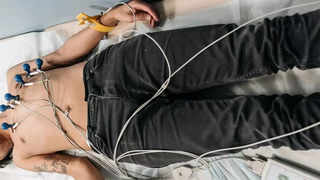01/10Learning to manage your long COVID symptoms after recovery

Recovery from novel coronavirus can take a while, depending on your symptoms. For many, it can also span into weeks, often a months-long battle, leaving them vulnerable to other medical frailties.
Known as long COVID, it has been estimated that 1 in 4 patients suffer from post COVID complications after recovery.
02/10What does post COVID or long COVID mean?


With symptoms ranging from heart ailments, impaired lung functions, cognitive decline and compromised immunity, long COVID-19 tends to affect the ones who have severe COVID-related illness.
Dealing with long COVID-19 can also be problematic. Long haulers have come forward to detail the possible symptoms they experience- and how it can take a while for them to resume life in a normal manner.
If estimates are to be believed, post-COVID syndrome can go on to affect anywhere between 25-30% of people suffering from COVID. In cities across the world, special post COVID care clinics have also been thrown open.
Since the virus can leave many struggling to manage their symptoms and get the quality of life back, doctors now warn people, especially the ones suffering from severe symptoms to have a recovery plan ready.
If you have just recovered, or at risk of developing long COVID, here's a guide to managing your condition and health in the long run:
03/10What are the symptoms you can experience with long COVID?


Considering the nature of the virus, the infection strain can affect people differently. Expect a multitude of symptoms, which can be mild or moderate in nature.
Headache, extreme and chronic exhaustion, backache, muscle pain, appetite loss, lingering cough can be experienced commonly in the first few weeks after recovery. It could be a persisting symptom or result of the remainder viral load in the body.
Reports that have come out in the recent months suggest that the most common long-term complications are damage to the heart, respiratory system, nervous system.
There have also been several studies which ascertain that a viral infection as major as COVID-19 could leave one vulnerable to developing some forms of mental illnesses, such as PTSD, insomnia, depression, anxiety.
Some people have also come forward to report brain fog, confusion, memory loss and cognition problems after recovery.
Most of all, what long haulers say is that their symptoms-no matter how small or big can impair daily functioning and present problems in resuming normal life.
04/10Dealing with different symptoms post COVID


Since long COVID symptoms are varied, they are managed and treated, depending on the type and severity of the signs you have.
While some may slowly recover over time, some symptoms of long COVID-19 can demand acute attention from day 1.
If you suffer from respiratory problems such as chest pain, experience shortness or difficulty in breathing, you might have to prepare yourself to make some changes in your routine, and additions. Some respiratory symptoms can also induce stress on your body and take longer to recover.
Since oxygen saturation is a common complication associated with COVID, many patients are often advised to use medical equipment like a nebulizer, oxygen concentrators and cylinders to make up for the deficiency.
05/10Be prepared for long-term care


Heart problems, which can occur when there is sizeable damage to the heart valves or blood clotting can worsen over years. Hence, long-time care and prevention tactics may need to be adopted.
06/10You may face fatigue and tiredness


Exhaustion and fatigue is also something that needs to be taken into concern. Remember, your body has just fought off a major infection. So, try and not exert yourself and take your time to recover, no matter how long or how arduous it may seem.
What one also needs to know is that COVID-19 also impairs your immunity to an extent and makes you vulnerable to chronic diseases. To safeguard yourself, adopt all preventive strategies and stay safe from danger. Good hygiene habits and post-op plans may also cut down your risk of reinfection.
07/10Keep up with the medications and devised treatment


Even though the viral load may have gone away, but it's doubly important to keep a track of your vitals when you are on the road to recovery.
Follow up on doctor's appointments, keep taking medications on time and any precautionary measures you may have been advised.
If you suffer from co-morbidities of any kind, you might be in need of altering or changing some of your medications. Diabetic patients report a major spike/ loss in blood sugar levels after recovery. BP levels may remain unstable too. Keep your doctor in the loop about any changes, or health prognosis.
Lastly, do remember to go for regular scans and checkups, which you may have been advised. Even if you feel well and healthy, the virus can often cause silent damage to the body which may create problems over time. Preventive checkups and tests may rule out problems before it gets too troublesome.
08/10Diet/ Exercise moderations to follow


Now more than ever should be the time one needs to concentrate on getting health back to normal and strengthen immunity. Following a good diet can help you with that.
Ensure that you consume a rich source of important nutrient groups- Vitamin C, D, B12, Zinc and Protein should be had in abundance. These will help your body recover faster, smoothen metabolism as well.
If you have been following a diet or special eating plan before COVID-19, pause for a while before getting back. The only focus should be scoring on plenty of nutrient-rich foods right now. Extreme weight loss can also be a side-effect after fighting any viral infection so make sure you eat well during recovery.
At the same time, do not pressure yourself to follow extreme workouts right after recovery. Slow down, adopt easy physical exercises which keep you brisk and get the heart rate up. Give your body the time it needs to heal first.
09/10When should one approach a doctor?


While most of the symptoms can be managed well, it is also important to be aware of any unforeseen or major symptoms which could be a cause of worry during your days of recovery.
Health problems like stroke, pulmonary distress can strike up out of nowhere, so consider seeking help or calling a doctor if you experience any of the symptoms:
-Extreme shortness of breath
-Oxygen deprivation
-Chest pain
-Built-up pressure around the heart
-Appetite loss
-Fever for more than 10 days
-Losing sensation in any part of your body.
Do remember to alert your doctor about any new or worsening symptom(s).
10/10Devoting time for your mental well-being and seeking help


Lastly, fighting COVID-19- even after you have made a healthy recovery can be cumbersome. There's a lot of stress which patients may experience. A changed, or degraded quality of life can also be difficult to accept for some. Some may also require help in completing normal tasks or chores which they were once able to do easily. This can drain you mentally.
Long haulers should consider seeking help or support to deal with physical as well as psychological symptoms of the virus. There are a lot of support groups online, as well as offline which help coronavirus survivors on their road to recovery and resume life.
As you heal, also make space for mindful practices like yoga and meditation. Not only can these practices relieve stress and anxiety, it can also help heal faster.












































































































closecomments
SIGN IN WITH
GoogleEmail